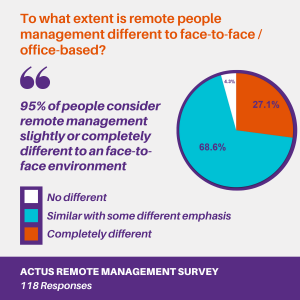As the uncertainty and dictates continue, it can often be difficult for the small business owner to get an actual handle on what may be working and what may not. One of the challenges has been how to handle and direct a remote work force. More of a challenge, still, is how to actually measure productivity and effectiveness regarding this remote workforce. In some recent research done by ActusUK, they have tried to get a sense of where remote work forces currently are and where they may be headed. The following is taken directly from that research:
- The survey revealed that 55% of respondents reported spending more, or much more time on people management activities, with only 16% reporting they spend less. A ‘collaborative’ approach was considered to be the most effective management style within a remote environment, where clear objectives are discussed and set together. Unsurprisingly, a ‘delegate’, hands-off style was voted the least effective. This explains the additional time spent managing people as a collaborative approach is much more time-consuming. Yet, it also emphasises the importance of providing clear communication and then employing trust to allow home-working colleagues to carry out a task effectively, and with greater autonomy.
- Another key finding from our survey results was that 95% of respondents value their role as a people manager or consider it a key responsibility that they take very seriously. This is a testament to the people managers who, despite a rapid shift to the working environment caused by the Covid-19 pandemic, have invested a great deal of time and effort to adapt their remote management style to ease the pressure off teams, despite having less visibility. At a time when employees are dealing with uncertainty both at home and at work, being proactive and adopting a human-centric approach is clearly a defining trait for successful people management.
- When asked what people management behaviours were more important within a remote environment compared to face-to-face, a staggering 82% of people rated providing frequent check-ins and one-to-ones as significantly more important. With teams distributed in varying locations, the need for pre-arranged conversations or meetings allows remote management to feel more structured and more onerous . Whereas office-based management would be more ad hoc. Additionally, 58% rated providing recognition and praise as more important within the current remote landscape, as was taking a personal interest in an individual, at 57%. As face-to-face interactions are removed, setting clear goals, recognising achievements and adopting an empathetic approach, is more vital than ever to ensure employees are continually motivated and encouraged within a virtual world.
-Written by Kevin Sawyer



